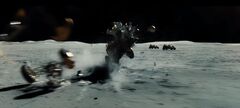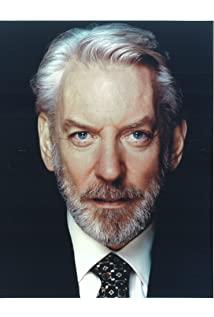1. Aesthetics
It's really "beautiful".
It can be said that this film has inherited the aesthetic temperament of old sci-fi films such as "A Space Odyssey" and "Fly to Space".
Rhythm: Very gentle, with plenty of shots of craft and rings spinning gracefully in space, comfortable.
Soundtrack: Roger Ebert commented on "2001",
While other film music attempts to emphasize the plot and guide the mood, Kubrick's choice of classical music exists outside the plot. It is uplifting and reverent, giving the image a seriousness and a sense of transcendence...and adding elegance to a space ritual. "
The soundtrack of the film achieves a similar effect, creating the solemnity and objectivity of space to a large extent.
Art: The differentiation of several scenes is in place, the earth - low-saturation warm colors, the moon - gray black, Mars - orange red, Neptune - cobalt blue, the light and shadow of different colors are strongly involved and become part of the story. And the director was willful, and the whole film was shot.
2. Reflective
If you come with the expectation of looking at the sea of stars, you may need to adjust it a little.
It does not talk about outward exploration, but hits the main trend of thought in Europe and the United States today—rethinking technological exploration and re-understanding the position of human beings in the universe.
Two main characters, father and son.
In order to pursue the truth of the universe in his heart, my father went far away from human beings. Many science fiction works have a similar discussion: In what areas does human relations work? For example, in "Three-Body Problem", humans flew out of the solar system and killed each other neatly in order to survive. For example, in "Flying to Space", people live in a strange environment for a long time, and some kind of mutation occurs in their hearts.
But the son is not the same kind of person as the father, extremely socially afraid and longing for emotional connection. In "Three-Body Problem", it is the crew who want to come back after leaving the earth for a long time. So the two generations clashed.
A person who escapes reality and self hides into the universe, and finally fails to reconcile with his father, but reconciles with himself. Space is sinister and nothingness, experience a circle and return to a warm home. This is a conservative proposition.
Compared with the trend of American science fiction in recent years, it is also looking inward and tending to be conservative. NASA's budget has also been shrinking year after year. In the past few years, the works of Nebula and Hugo Award have all focused on race, rights, humanity, and homeland. It is no longer the boundless space, but the present is more important than the distance. As the father said in the film, "Although there are countless strange and magnificent new worlds in the distance", "in this era, there are too few people like me".
This is the story of an escapee who has gone through a long journey and finally returns. Why do humans go to the stars? The answer to the question may no longer be blurted out.
Finally, technical bugs do exist, but the director doesn't care about them. Traditional sci-fi audiences may feel a sense of tearing, noticing the flaws, but also being able to immerse themselves in emotions.
The hardest thing in the world is to combine pure inner struggle with a completely cold and objective universe. This film tries to make you feel both at the same time, and sometimes it almost does, sometimes it loses itself.
Yesterday, the "Time and Space Viewing Group" was held, and the impressions of several guests can also refer to:
Zuo Heng, associate researcher at China Film Art Research Center:
Over the past two years, I have gradually felt that the film has entered a technical twilight. In this state of mind, I was like the old guy with cataracts in the film, and I couldn't see clearly. It can only be said that the audio-visual experience of this film is different from that of many previous sci-fi films. In recent years, science fiction films have generally entered a heavy tone, and this one is no exception. And it's set in the near future, which seems to be connecting the future to the space experience seen on tech channels today, and then zooming out a bit further. (This future) allows you to reach, but to reach is terrifying.
The large number of ruined buildings in the film also reinforce this feeling. It still talks about the father-son relationship that Americans like, and there are many happy pictures of the Golden Age in the spaceship, and the sense of ruin is even more obvious. Finally flying back to Earth is also something Americans like. They may not be able to understand our mood when we watched "The Wandering Earth" at the beginning of the year, and they have a more Ulysses complex for the earth. There's something more ancient at work here, but what it is, it's unclear. This messy feeling is also in line with what the film did not show at the end. In science fiction movies, it is a relatively luxurious feeling.
Lin Pin, a teacher at Capital Normal University and a scholar of youth culture research:
If this film is called "Exploring the Heart in the Interstellar", it is actually more accurate. Compared with the space films that are usually contacted or expected before watching the movie, it has some special audio-visual effects. Aurally, it has a large number of personal inner monologues, and visually, there are many shallow focus shots, only the protagonist can be seen clearly, but other people and the spatial background cannot be clearly seen. There are also many subjective viewpoint shots, showing the scene the protagonist sees. There are also many brief flashbacks that represent fragments of memory. It's not so much a space movie as a psychodrama set in space.
It successfully and intensely creates a psychological feeling that all humans have, perhaps even more intensely in space: loneliness and alienation. In addition, its art and photography are very good, and it is very charming for the wonders of space.
Teacher Zuo Heng mentioned Ulysses, which is the Odyssey. Kubrick's "2001 Space Odyssey" took us to a completely unknown far away from human beings, but this one is more like the "Odyssey" of ancient Greece. Back to our familiar places, back to familiar communities, back to lovers. The protagonist has changed from a person doing a psychological evaluation with his head down to a person returning to the center with his head held high. If you come with this expectation (see 2001), you will feel unsatisfied. It goes back to the ethical relationships of the American middle-class nuclear family, rather than to another world of high impact and subversiveness.
Science fiction writer Kang Jinhuan:
The background of the story is a black novel of the cosmic era, a traditional tough-guy detective-style black novel - a single-line story from the first perspective. There is a huge puzzle at the beginning. The protagonist wants to solve the puzzle, but there are obstacles everywhere. The organization that said it was helping him was actually hindering him. This kind of story is difficult to write and film, there is no perspective switching, and it feels a bit pseudo-documentary. In the end I came to the conclusion: don't work overtime, don't work for the organization.
Young Artist Wen Na:
suffocated. I especially like space-themed stuff, and I once dreamed of walking on Jupiter. This movie hit me with the senses. I paint murals, often very large scale things, and this film really allowed me to find the boundaries of what I can bear. I have imagined countless times into the starry sky, feeling the storms of Jupiter, the gas of Neptune, and farther than Pluto. This film presents the romance and cruelty of all that for the first time, and shows me what I can bear. Not as big as expected. The whole film runs through a kind of despair, the infinite space and the magnificent universe oppressing me. No matter how boiling, lively, meaningful, and charming the earth is, it is still a lonely blooming flower in the cosmic valley. This feeling of loneliness is inexplicable.
Live audience:
The movie opens with a description of the commercialization of the moon, which is cool. I was very calm during the entire viewing process, but when the capsule landed at the end, there was a little tear in the protagonist's eyes, as if he was suppressing his emotions the whole time, but in the end it contained great power. This is what surprised me.
View more about Ad Astra reviews











